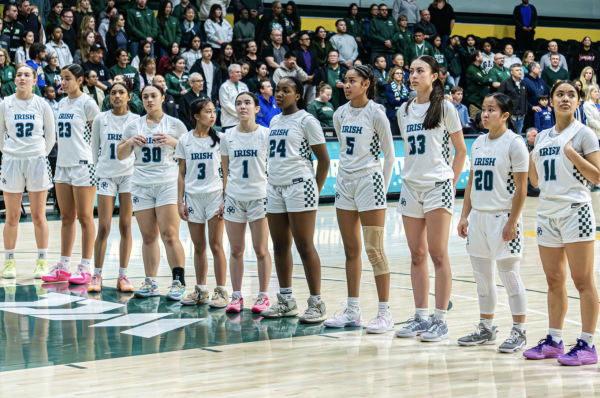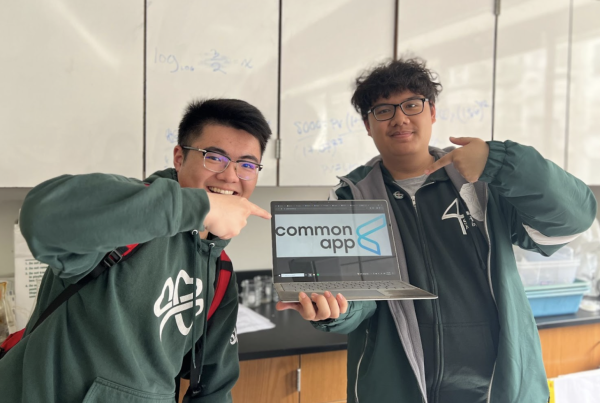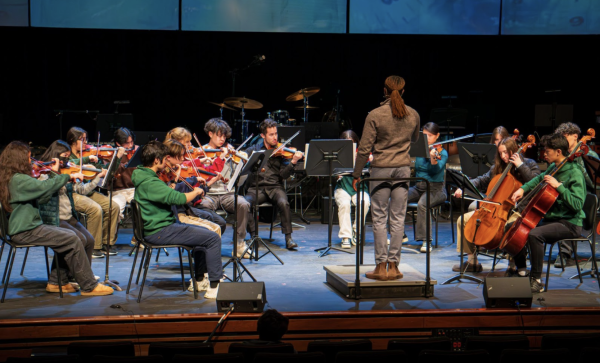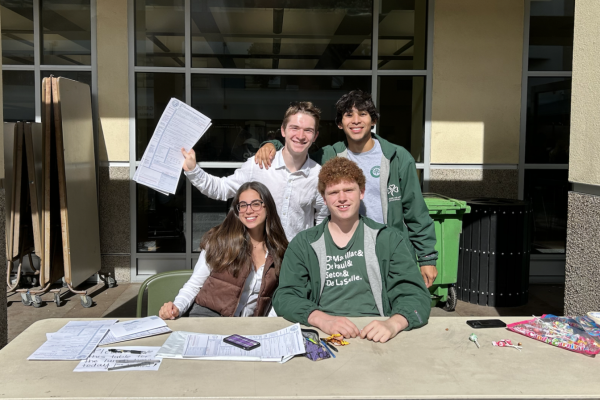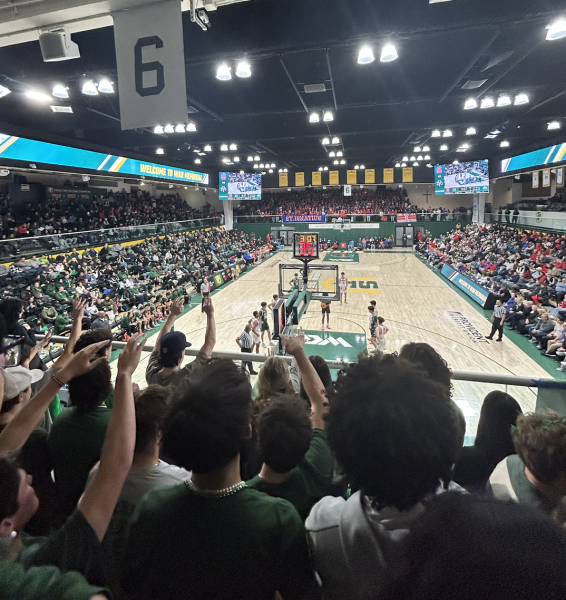High School in the Eyes of Chinese Immersion Students
Sacred Heart Cathedral epitomizes a diverse community with students rich in culture. The majority of students at SHC grew up in the Bay Area, while a few students grew up in foreign countries. Anson Zheng (‘18) and Xu Cheng (‘18) grew up and attended school in China.
The schedule, teaching method and competition differ between high schools in China and the United States. In China, students attend high school from about seven in the morning to five in the evening, then they take a break or go home and resume night classes from seven to eleven.
In America, high schoolers stress about getting accepted into their favorite college while in China, middle schoolers work hard to get accepted into a prestigious high school. High school in China is equivalent to college in America. For this reason, when Anson and Xu were interviewed about their schooling in China, they spoke mostly about their middle school experience.
We first interviewed Anson (‘18) about his global schooling experience:
Q: What program granted you the opportunity to come to SHC?
(Anson Zheng): “Well, I used to be a part of the program called Cambridge, but after last school year I quit the program. But I now still come here, so now I’m a regular student.”
Q: What was the name of your school in China?
(Anson Zheng): Chinese Foreign Language School (广州华侨外国语学校)
Q: What were some of the subjects they offered in China that they do not offer here?
(Anson Zheng): “So, we need to take Chinese, math. The math in China is kind of different. They mix everything. And then English, well, we have no option for other language. English is the only option. And [in] science class we have Biology, Physics, and Chemistry, and then we need to take Geography, Politics, and History. We have many subjects in a year.”
Q: So you said that the math classes in China blended in all the aspects of math. Can you expand upon that?
(Anson Zheng): “Yes, well, when I was in primary school, I learned… about Algebra and Geometry at the same time. They mix every math subject [into] the same math book. That’s why we just call the class math.”
Q: How are the learning expectations in China different from here at SHC?
(Anson Zheng): “In the middle school [in China], if you do not do well, you still stay in school, but you cannot go to high school… high school is not part of the education requirement. If you do not do well in middle school, that means you can’t go to high school.”
Q: What was the hardest thing you had to overcome, or adjust to, when coming to a new school in another country?
(Anson Zheng): “I guess it is the English language. It has [taken me] many times to fix my grammar and pronunciation. You can still tell I have [a] strong accent.”
Q: Is the school day structured the same as here in SHC?
(Anson Zheng): “Not really. In China, we have…six to seven classes a day, but every class is, I would say, forty-five minutes.”
Q: When does your school in China start and end?
(Anson Zheng): “School starts at 7am, and it ends at 6pm. And, after that, we have homework to do.”
Q: How big was your former school compared to SHC?
(Anson Zheng): “I guess [there were] a few hundred [people]. It was a big school. SHC is bigger [though] because in China we only go to middle school for three years, but here we go to high school for four years. So we have four classes here, but we only have three classes in China.”
Q: Are there any similarities between teenagers in China and teenagers in SHC?
(Anson Zheng): “Well.. interesting. The similarity, I would say, [is that] some of them work very hard, but some of them just [don’t care] at all.”
Q: What are the differences between teenagers in China and teenagers in SHC?
(Anson Zheng): “The students here [at SHC] are more willing to help each other. In China, the competition is very big.”
Q: So you would say SHC is a more inclusive community?
(Anson Zheng): “Yes, but I still have good friends [in China].”
Q: What are the similarities and differences between the American culture and Chinese culture?
(Anson Zheng): “That’s a hard thing, to tell [the cultural differences]. But, let’s talk about families. The parents here [in America] kind of let their kids take their own responsibilities in school, but in China, the parents keep tracking the student’s grades and everything about school. If [students in China] do not do well, they can get very mad.”
Q: What was the best memory you’ve had at SHC so far?
(Anson Zheng): “The best memory [I’ve had was] last year. I got a freshman Irish Spirit Award.”
Q: What does community mean to you in China versus what community means to you at SHC?
(Anson Zheng): “For me, the community in China is like a place [where] people live together, but community here is something like people get together and share themselves.”
Q: What do you think about SHC’s community (students, teachers)?
(Anson Zheng): “Well, the SHC community is like everyone in the school is family. That’s why I feel that everyone here is very friendly, so I just feel like we are a big family in this school.”
Q: What extracurriculars activities were offered in your middle school back in China?
(Anson Zheng): “There’s not that much because we all focused on learning and to try to get into high school. Everybody had to work very hard.”
Q: What are the differences between teachers in China and the teachers of SHC?
(Anson Zheng): “Well, for example, if I had a question for my teacher [in China] they would say, ‘Uh hunh. Anson. Why don’t you listen to me in class. What’s going wrong with you?’ and the teacher [at SHC] will explain to me what’s going on. I guess the word that I would use [to describe the teachers at SHC] is patient. And sometimes the teacher in China would call you back to school on the weekends or vacation just to study. But that will never happen here.”
Q: You are always seen around the school talking to teachers, so this might be a hard one, but who is your favorite teacher?
(Anson Zheng): “It’s really a hard question because I feel like everyone [of my teachers] is so nice.”
Q: Have your ideas about community changed after coming to SHC?
(Anson Zheng): “Hmm.. the thing is the change here is that everybody here is pretty friendly and pretty nice. They would give me as much help as I need. On the first semester, I only had a 3.17 GPA, but I caught up to 3.83 on the second semester.”
We then spoke to Xu (‘18) about his schooling experiences here and in China:
Q: What program granted you the opportunity to come to SHC?
(Xu Cheng): “I actually came to U.S. in eighth grade. I went to St. Joseph’s Mountain View and then I just took the High School Placement Test– HSPT. Then I got accepted by SHC. I know a few students … who were initially a part of the Cambridge program, but I am not a part of it. I am still an international student.”
Q: What school did you attend in China?
(Xu Cheng): “I went to ShenZhen Foreign Language School Branch in my hometown. It’s kind of like an international school.”
Q: What time did you start school?
(Xu Cheng): “We usually start at 6:30 in the morning. We have a break at 12pm and then two hours of rest from 2pm-4pm. My school is a boarding school, so we still do clubs and sports. From 7pm-10pm it is study hall, then we go back to our dorm at 10:30pm.”
Q: What was the hardest thing you had to adjust to when coming to America?
(Xu Cheng): “The hardest thing for me was the language and [adjusting] to the food. The food in America is very different from the food in China. I like steak pretty much.
Q: How big was your former school?
(Xu Cheng): “[There were about] 1,500 [students].
Q: Are there any similarities or differences between students/teenagers at SHC and your former school?
(Xu Cheng): “Yeah! I would say the biggest difference here is that people are more outgoing and more passionate about things. So in China, there are high school tests, and that’s the most important thing of their lives. But I went to an international school, so the ACT and SAT [in China] is like the high school placement test [in the Bay Area]. So we [in China], we took a lot of time to prep for those tests by doing charity works. People here do a lot of club activities and are more confident and outspoken.”
Q: What do you love about SHC?
(Xu Cheng): “I love the community. I like the diversity. All the staff and students are very friendly to the international students. Our English is not so good, but they cooperate with this [very well]”.
Q: Who’s your favorite teacher?
(Xu Cheng): “Well I like a lot of teachers; I like my calculus teacher, Mr. Compton, my Japanese teacher, Mr. Abe, and I like Mr. Knapp as well.”
Q: Has your definition of community changed ever since you enrolled at SHC?
(Xu Cheng): “Hmm… Well in China the community is different. Here, you have different blocks [with mostly different people], but in China, students have the same schedule [and will be in the same class with the same people] for the whole day. All the classes [you take] in China [have their own] community. Because the same three or four years are spent only with their classmates, [students in China] form strong bonds which last twenty seven years. The community here is more [dispersed] within clubs, close friends, and sports teams. In China, the sports teams do not have strong bonds with their teammates because they don’t get a lot of time to gather. I know here in America, [sports] are very important and [people] spend a lot of time practicing, which gives them a chance to bond [with their teammates]. In China, the sports are more like just practicing with no connection between [other teammates].”
Q: Do you play any sports?
(Xu Cheng): “Yeah, I play golf, diving, and basketball.”
Q: What’s the difference between teachers here and teachers in China?
(Xu Cheng): “The teaching process is different. The teachers in China they teach you more than answering questions [from students]. There is less interaction between the teachers and the students. The teaching pace in China is a lot faster because we cover 3 years [worth of material] in 2 years which is why Chinese students [excel] in science and math. There is also a lot more homework in China. The teachers here interact with their students more in class– and I really like it.”
Q: What was your best memory here at SHC so far?
(Xu Cheng): “My whole two years!”
Q: What are some subjects that are offered in China, but not here? Vice Versa?
(Xu Cheng): “Well, since I went to an international school, the class schedule is similar to here. Spanish and English are the two languages we take. The religion classes were not offered at my school.”
Q: How are the learning expectations different in China and America?
(Xu Cheng): “In China, the teachers and parents generally want you to get accepted by the top high schools and colleges. Here, teachers and parents would like you to develop an independent role as well. Also in China, they encourage you to do volunteer and be competitive so that you can go to different countries and do charity works.”
Q: What is your favorite subject here?
(Xu Cheng): “I actually have two classes that I really like. I like English and Math. I take AP Calculus. I think so far [in my sophomore year], I have a great english teacher. As a freshman, I had Ms. Bechelli. She was really nice and she helped us a lot– all the international students. For me, I always went to her for help after school and she was always patient and helpful. I like my math class because it is one of my strong subjects, and I like Mr. Compton.”
Q: What do you think about SHC’s community?
(Xu Cheng): “It is very diverse and friendly. They can bring different people together, [despite] the difference in personality and background. SHC is very diverse and they treat each other very equally.”
Q: What are some of your favorite activities?
(Xu Cheng): “I play a lot of sports. I do golf in Millbrae — It is one of my favorite things to do every weekend. Another thing I like to do is go around San Francisco and go to different restaurants. I want to taste different food from different countries, there is really good food around San Francisco!”
Anson matches the color of his polo to the type of day. The Blue Day we interviewed him, surely enough, he came in his blue SHC polo.
Xu takes Computer Programming and is already in Calculus AB as a sophomore.
These are just two of the many unique foreign exchange students that go to SHC. They expand the already diverse student body and embody a new culture. They see SHC in a whole new perspective with strongly developed ideas about our community and camaraderie. The international students will forever be able to proudly call themselves the Fightin’ Irish. They are amazing additions to our ever-growing community.



